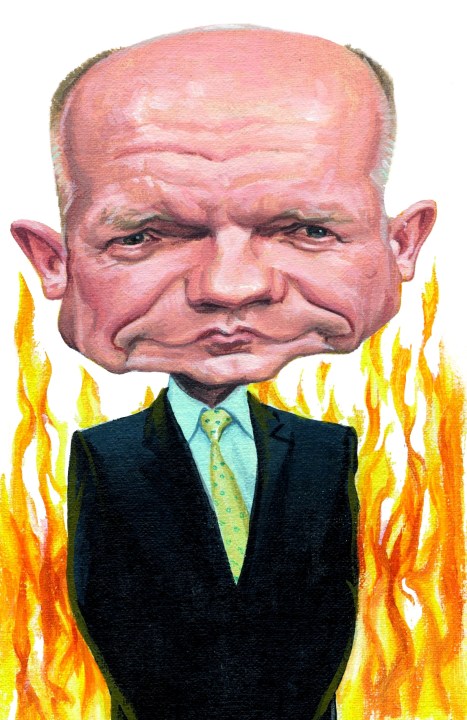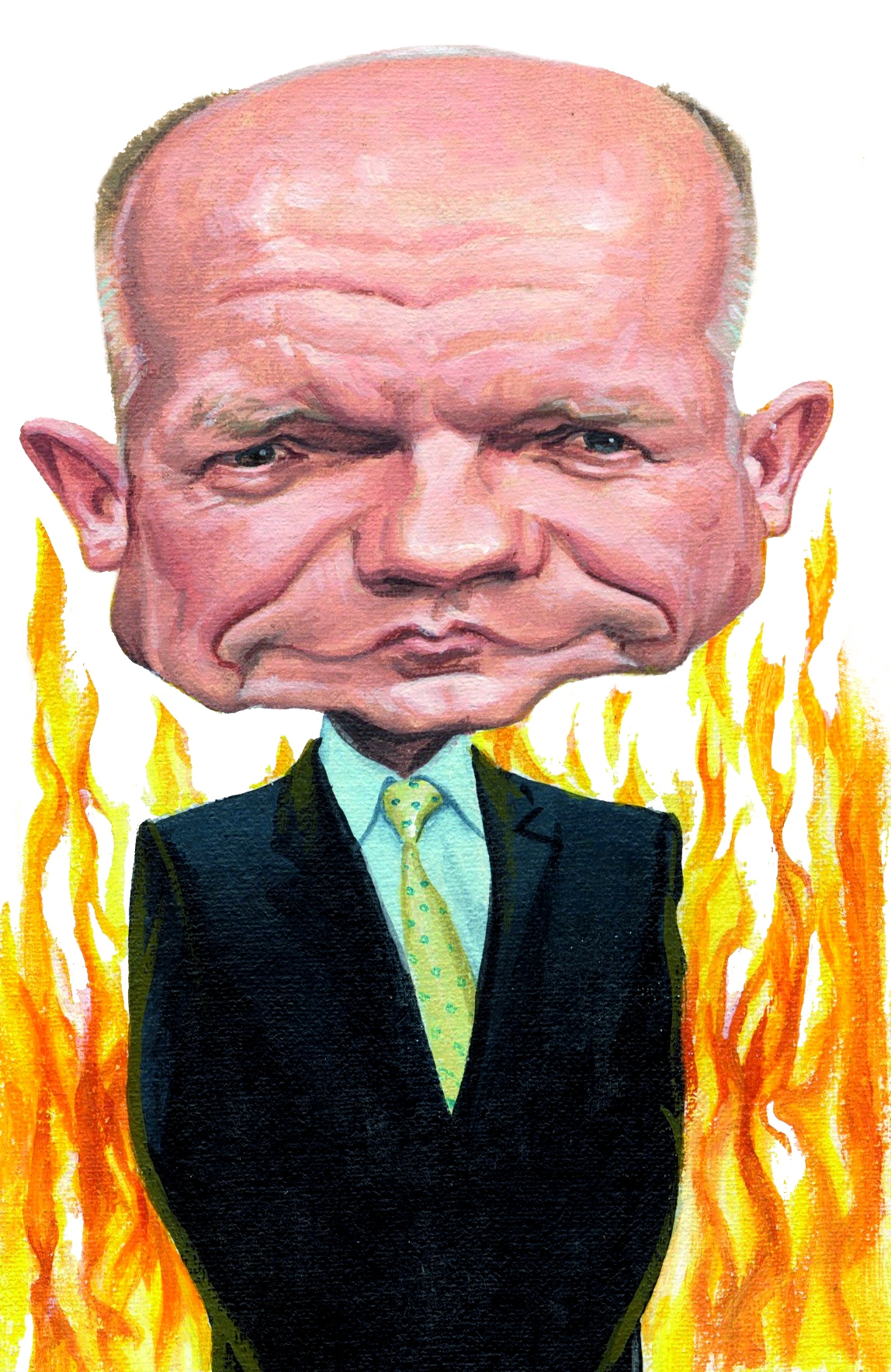 James Forsyth has interviewed the foreign secretary, William Hague, in
James Forsyth has interviewed the foreign secretary, William Hague, in
tomorrow’s issue of the Spectator. Here is an extended version of the piece that will appear in the magazine.
Politicians normally have to wait for the history books for vindication. But for William Hague it has come early. All his warnings about the dangers of the euro, so glibly mocked at the time, have come to pass. But, as he makes clear when I meet him in his study in the Foreign Office days before the start of Tory conference, he is not enjoying this moment. Rather, he is absorbed with trying to sort out the mess that others have created.
Leaning back in a red leather chair in, what he readily admits, is ‘the grandest room in government’, Hague tells me that, “It was folly to create this system, it will be written about for centuries as a kind of historical monument to collective folly. But it’s there and we have to deal with it.”
When I put it to him that Greece defaulting without devaluing — as the bailout plan apparently dictates — would be the worst of all worlds, he replies: “I described the euro as a burning building with no exits and so it has proved for some of the countries in it. But there are no exits.” The logic of Hague’s words is stark: those inside are going to die, or at the very least be seriously burned.
Hague, though, quickly realises the implications of what he’s said and tries to clarify it. “You can have burning buildings where they manage to put out the fire or control it or get more room or something. I might take the analogy too far but it’s not built with exits so it is physically a difficult thing to leave a currency without any plan to do so I don’t think we can advocate that but they are on very unpalatable choices and it clearly means that being in the Euro that Greeks, or Italians or Portuguese have to accept some very big changes in what happens in their country, even bigger than if they weren’t in the Euro and Germans will have to accept that they are going to subsidise those countries for a long time to come really, for the rest of their lifetimes.”
Hague clearly thinks that many of the single currency’s problems stem from having fudged the rules to let some of these countries become members in the first place. He remarks ruefully that “there are lots of lessons for the future in not including in currencies or in other groupings, countries that do not meet the standards but those are the lessons for the future.”
But the Foreign Secretary is adamant that Britain should not hope for the break-up of the single currency. “We are very concerned about what would happen if the euro broke up and so despite all our opposition to it and our opposition to it has been completely vindicated, now the government is in it and has to face up to the unpalatable choices which we always said they would face. We must support them in doing that but also protect our own national interest at the same time which we absolutely will do.”
George Osborne recently set the Eurozone countries a six week deadline to push through already agreed measures to try and protect the Euro. But Hague refuses to be drawn on what will happen if this deadline is not met, simply saying that if this happened “then we’ll be even more worried.”
When it comes to Britain’s own relationship with Europe, Hague is clear. “The EU does have too much power, I haven’t changed that view from being in government, in fact if anything being in government has reinforced that view and there should be powers that are returned to this country”
But he is far less clear about what he is going to do about this. I ask him if there was a new EU treaty before the next election, would the coalition push for the repatriation of powers. He replies that “the answer to any hypothetical question about what the coalition would do is we’ll have to discuss it in the coalition”. Considering that the Liberal Democrats’ policy point person in the coalition is Danny Alexander, who was the head of communications for the campaign to take Britain into the single currency, this is not an answer that is likely to reassure the Tory delegates gathering in Manchester next week.
Hague seems to see bringing back powers as very much a second term issue. He speculates that it could be “in 2015 one of the dividing lines between the coalition parties, put forward at the next election”.
Europe, though, is far from the limit of Hague’s brief. He is Foreign Secretary at a time when British troops remain on the ground in Afghanistan alongside the Americans and other Nato countries. But Hague won’t repeat the recent claim by the chairman of the US joint chiefs of staff that the Pakistani intelligence service was involved in the attack on the US embassy and the headquarters of the international forces in Kabul. “No, no, that is not something I would say,” he says. When I ask Hague if the remark was unhelpful, he simply replies, “in their congressional testimony they make their own decisions about what to say but I’m not going to join in on that.”
Another issue worrying the Foreign Secretary is Iran. He predicts that the regime’s nuclear ambitions will cause a crisis within the next year.
Then, there is the Arab Spring — the event that Hague has described as the most important of the century to date. He remains broadly optimistic about its direction, but concedes to having concerns about what is happening in Egypt. He frets that they have a “very difficult economic situation that they’re not doing enough quickly enough to improve, to bring about long-term
improvements to their economic situation and that could bring about further political instability.” He urges the Egyptians to get on with creating a “strong presidential system”. “We can’t design them a system, but Egypt faces so many difficult economic problems apart from other issues; they do need a strong government and the danger is that they will have parliamentary elections and then not for a long time be able to bring about the constitutional framework and not have clear leadership.”
I ask Hague how the situation in Syria, where the regime has been butchering its own people for six months, makes him feel. In reply, Hague rattles off the list of measures that the government is taking to increase pressure on Assad. But when I press him on what he feels when he reads the reports of what’s going on, he retorts “I try not to think about them emotionally. My job is to remain cool in all circumstances, but morally it is dreadful and the practical consequences for families in Syria are terrible, but we always have to be calm and rational about what we can do.” One senses that for Hague, cool and rational are two of the cardinal virtues.
Hague’s status as a former leader accords him a unique place in the Conservative party. As he coyly concedes, “I do fulfil a role of advising the Prime Minister more widely than on foreign policy”. The photo that sits directly behind him which shows, him Cameron and Osborne visibly relaxed and beaming triumphantly with their arms around each other’s shoulders is evidence of how close he is to both his former speechwriter, the Chancellor and the Prime Minister.
He says that his advice is “to protect at all times, our education and welfare reforms and any changes to the tax system that will ultimately lay the foundation for a more productive economy.’ When other plans have threatened that, he has ‘sometimes recommended’ modifying them. When I ask him if he means the health reforms, he chuckles and says ‘Well, I’m not getting into details’.
In Hague’s view, the Conservatives are now a “fiscally conservative, socially liberal party”. He also thinks that it is a more Eurosceptic party than when he led it. But he stresses that this is in a “united way but not in any irrational way.” Indeed, Hague is very keen to point out the limits to Euroscepticism in the government. He tells me that no Cabinet colleague has ever told him that they favour either withdrawal or a radical renegotiation of Britain’s membership — a surprising statement since several Tory ministers will happily say such things to journalists. “People are not running around jumping to extremes,” he says somewhat sniffily.
A few months ago the press took to speculating that Hague’s heart wasn’t in the job. But this talk has died down since the success of the Libya intervention. Hague certainly seems energised. He says that he feels he now knows how to “drive this machine”. Observing that it was the week spent doing intensive diplomacy to prevent the slaughter in Benghazi that taught him “how the machine responds to everything you want it to do”.
The Foreign Secretary also has advice for the new intake of Tory MPs, especially those who want instant promotion. “You need to build up your skills and often the people who are first promoted to junior ministers are not the people who ten years later are cabinet ministers or leaders of the party. So people shouldn’t fret… they will find that in due course their talents are needed.”
What Hague will do next is one of Westminster’s favourite guessing games. But he is giving nothing away, stressing that his departure from politics will come “some distant day”. When I inquire if this is his last job in public service, he carefully replies: “Not necessarily”.
One thing that Hague is prepared to rule out, though, is succeeding Cathy Ashton as the European Union’s external affairs commissioner. When I ask him if he would like the job, he fixes me with a half offended, half puzzled stare before saying “is this some kind of joke?” He assures me that “any job I have in the future will not be in the European Union”.
One senses, though, that when he is finished with politics, Britain might not see too much of the Foreign Secretary. He waxes lyrical about New York saying that he finds it “the most exciting city in the world”. He quickly adds that “London is pretty much up there with it”, before saying that “as a politician living in London you get many of the benefits of London but you don’t enjoy it as a normal person.”
When the interview ends, Hague walks me to the door of his office regaling me with tales of the Foreign Office’s history. One can’t help but wonder if this great office of state might not be the subject for one of his books in future.








Comments